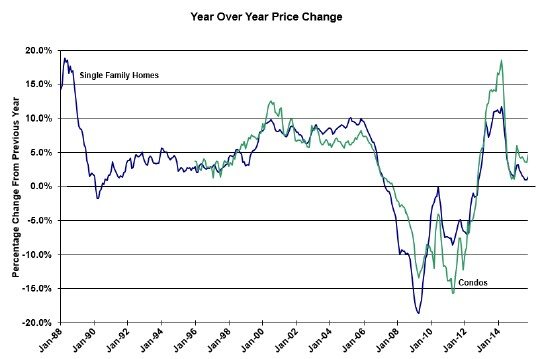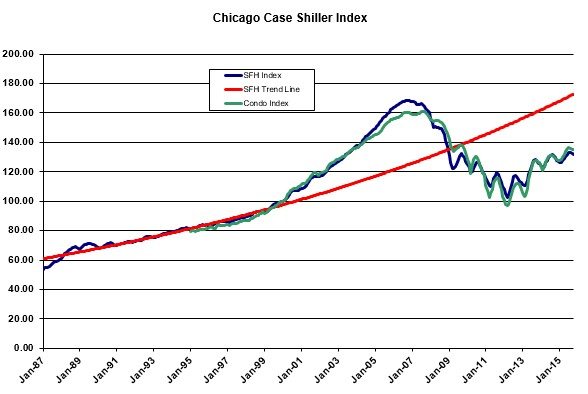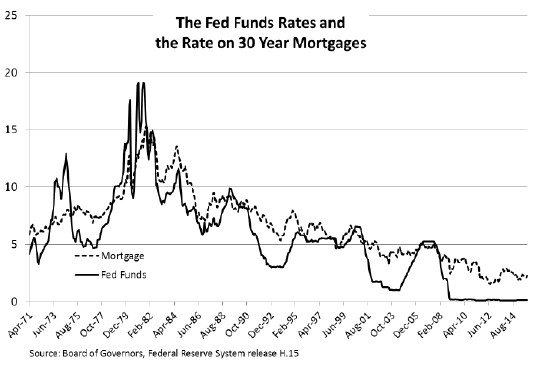The picture is brightening a little bit for Chicago home prices according to this morning’s release of the Case Shiller home price index for October but when compared to the other 19 metro areas Chicago is still in last place for year over year price gains. I believe that makes this the second month in a row that we are in last place.
Chicago single family home prices were up 1.3% in the last year, compared to a revised (yeah they keep revising the historic index values for reasons that I am not privy to) 1.0% for the 12 month period ending in September. Condo prices were up 4.6% year over year, which is up substantially from September’s 3.5% year over year increase. So we’re seeing healthy price increases on the condo front but not so much on the single family home front. Check out the graph below for the long term trend in year over year price changes for these two metrics.
What’s really sad here is that 3 of the metro areas are seeing double digit percentage increases in prices in the last year – Denver, Portland, and San Francisco – so Chicago is really eating their dust.
And in case you are wondering we also know from the seasonally adjusted data that Chicago home prices are still rising. Wait a second…didn’t I just say that home prices were rising? Welllll, based upon two data points one year apart they are rising but we can also look at the change from September to October to determine if they are rising. However, in that case we need to look at seasonally adjusted data because we are at a time of year when prices are falling. In fact, the index for single family homes actually fell 0.7% in the last month but when you take the seasonality out of the numbers prices actually rose by 0.7%. Condo prices were unchanged from last month.
The long term trend in the Case Shiller Chicago home price indices is plotted below along with the long term trend line. Despite widespread rumors of a new housing price bubble single family home prices are still 22.1% below the bubble peak and condo prices are 16.0% below the peak. On the other hand they have substantially recovered from the bottom of the market with single family home prices up 27.9% and condo prices up 39.0%. However, when you look at the graph it doesn’t seem like there is that much of a difference between the recovery in condo prices and the recovery in single family home prices. I think the main difference is that condo prices didn’t go as high but actually fell further than single family prices.
Home prices obviously still have a lot of catching up to do. Comparing prices to that long term trend line we see that single family home prices are lagging by 23.9%. Furthermore, single family home prices are still lower than the entire period from June 2003 – January 2009 and condo prices are lower than the entire period from October 2003 – November 2009. That implies that a lot of people who bought during those 6 year periods have still lost money on their homes.
Maybe the October data is just the first sign of prices back on the rise, which I have actually been expecting for quite some time now, given the extremely low level of inventory available.
But What About The Impact Of Rising Mortgage Rates?
I found it interesting that in this month’s release David M. Blitzer, Managing Director and Chairman of the Index Committee at S&P Dow Jones Indices, commented on the supposed threat of rising mortgage rates. As in my blog post of a couple of weeks ago, The Federal Reserve Is Not Raising Mortgage Rates This Week, he compared the 30 year mortgage rate to the fed funds rate but over a much longer time period. You can see that the two rates track in general over a very long time period but over shorter time periods there can be substantial changes in either rate that has little correlation with the other rate.
David also points out that the Federal Reserve does not project increasing the fed funds rate much more than 2% over the next two years so his conclusion from looking at this data is that “potential home buyers need not fear runaway mortgage interest rates.”
#CaseShiller #Realestate #HomePrices
Gary Lucido is the President of Lucid Realty, the Chicago area’s full service discount real estate brokerage. If you want to keep up to date on the Chicago real estate market, get an insider’s view of the seamy underbelly of the real estate industry, or you just think he’s the next Kurt Vonnegut you can Subscribe to Getting Real by Email using the form below. Please be sure to verify your email address when you receive the verification notice.


